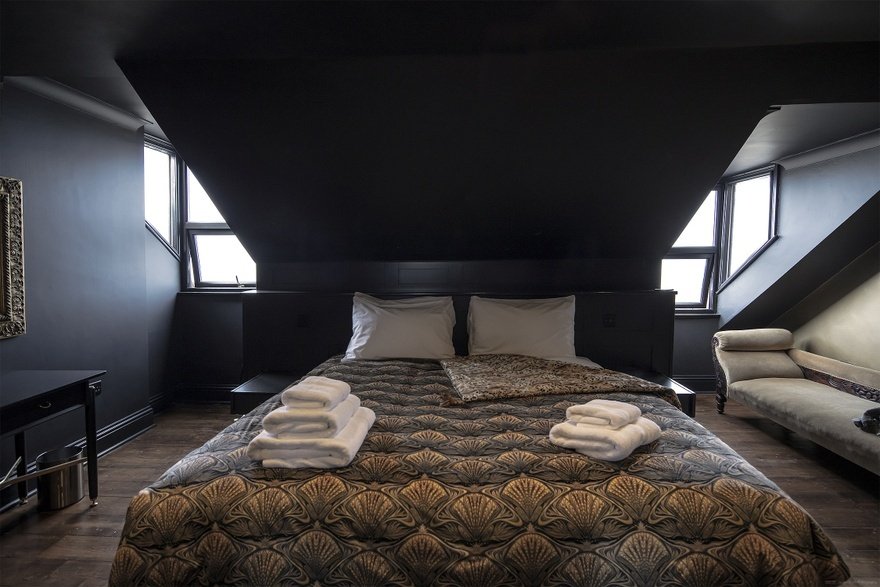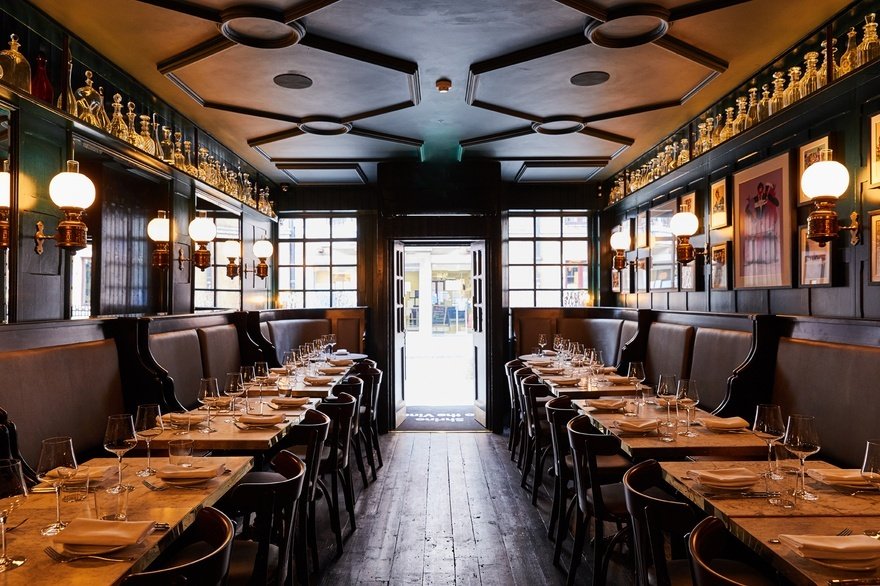Reviews: Joel Golby finds out if the Albion Rooms is really a hotel, while Giles Coren is pleased by Soho's Noble Rot
Joel Golby of The Observer heads to Margate to discover if the Libertines' Albion Rooms really is a hotel…
We're going to have to confront the idea of whether the Libertines' new venture the Albion Rooms is a hotel or not, and I am going to argue not.
There's tea and coffee facilities but there's also a curated box of Libertines-endorsed vape juice. At some point during the night, the mask of ‘hotel' slips, and the Albion Rooms becomes something other: an escape room just for goths, an afterparty from a sumptuous music video. It's less a boutique B&B, more a place you happen to sleep in while having the luckiest bender of your life.
The fact that it's a hotel that provides clean towels and allows people to sleep here then eat a hearty breakfast feels more like luck than judgment. Less a hotel, more a sort of ‘gentrified flophouse'.
At no point, looking at that photo of Carl Barât and Pete pouting with their tattoos on the cover of the Libertines, did I think, "they look like hoteliers".
The William Blake room has lush black crocodile-effect wallpaper, gold-painted window frames and leopard-print cushions. Part of you creeps up the stairs to the Albion Rooms and expects something squalid – a mattress flopped artlessly on the floor, a man with zero body fat looming toplessly in the corner, a feral cat running around – but what you get is considered rock star chic: neon crosses, gothic carpets, a tile mosaic in the bathroom that reads "you pissed it all up the wall".
The team recruited out-of-work set designers displaced by Covid, and you can tell – the rooms have the kind of flourishes and thought that makes them completely Instagram-worthy, but not so pristine that you feel bad about drunkenly throwing up on the floor of them.
Price: from £115 a night
The Times' Giles Coren finds Noble Rot's new Soho outpost ‘every bit as a good' as he hoped
I loved the Gay Hussar enough to go a couple of times a year for the next quarter of a century.
But times changed, politicians and journalists stopped breaking halfway through the working day for terrible, drunken, combative lunches, other dining options presented themselves and, after nearly going under in 2013, the old place had finally closed its doors. As soon as Dan [Keeling, Noble Rot founder] dropped his bombshell, I agreed that it would indeed make a fine second home for Noble Rot.
The carpets and soft furnishings have been stripped away to reveal – phew– half-decent wood beneath and thus an elegant "Georgian townhouse" look that obliterates any sense there might have been of something somehow "missing" from the space.
On the menu there were eggs casino, the Hungarian devilled egg classic with its bright yolk swirled into a spiral and flashed with Hungarian paprika, and served on a salad of chopped apple, potato and cornichons. There were choux buns with duck liver pâté and a tokaji jelly and game-stuffed cabbage leaves with sour cream that were gentle and mild and just so very central European.
The two standouts: a robust and aromatic goulash, ruby red in colour, a perfect balance of fat and lean in the beef, with some cubed boiled potatoes, sour cream and slivers of green pepper; and then a whole roasted chicken with morels and vin jaune, jointed and served in a big white oval dish, golden skin-side up, on a blanket of warm, winey cream with riz pilaf. It is an absolute showstopper of a dish and with a bottle of decent red burgundy (they have a few) would do me very well for my last meal on earth.
The food is more Hungarian than I thought it would be and every bit as good as I had hoped. The cooking (by Alex Jackson, formerly of Sardine, in semi-collaboration with Harris) feels a little less progressive here than at the first Noble Rot, a little more gemütlich, which is as it should be.
Price: around £50 a head before wine. Rating: cooking: 8/10; vibes: 9/10; history: 10/10; total: 9/10
William Sitwell of The Telegraph is reminded why hospitality should be saved at the Unruly Pig, Suffolk
It's worth reminding ourselves of how far we have travelled. And the Unruly Pig is a joyous reminder. Indeed our lunch made me want to drag every unhelpful, sulky waiter or waitress there to show them how it's done; that confluence of science and art. Warm professionalism simmers at every turn as you are led into your booth, cooked for and served.
[We] shared some warm and enticing arancini, flecks of Parmesan melting on top, and then a slice of focaccia, heaving with gooey burrata and pesto with extra pine nuts, before I devoured an impeccable duck-liver parfait.
Any remaining idea that this is just an old pub quickly dissipates when the food arrives. The duck liver, for example, comes sparse and bald on grey ceramic; a brioche roll, a curvature of small peach slices, a small pool of chutney and the ovoid parfait with a few grains of salt. The largesse of flavour manifests itself and perfects the ratio of plate to food. It's just fabulous.
The chateaubriand emerged as a cargo of charred and pink beef strips on a brown board, with Hispi cabbage and a groaning plate of macaroni cheese with chorizo and ‘nduja. The achingly trendy board ‘plate' annoyed me at first. But the food on it was delicious. Rich and tasty, and refreshed with sprightly tops of salad onions. My wife loved her dish of freshly made rigatoni, al dente and flecked with chilli and garlic, and proving the Unruly Pig covers all bases.
Price: £115 for four, excluding drinks and service. Rating: 5/5
The Guardian's Grace Dent insists the dessert trolley at Maison François in London's West End could ‘spark joy in the saddest heart'
Matthew Ryle, an ex-MasterChef 2018 finalist, is chef, having trained at the Dorchester and then worked at Isabel; the founder is the affable François O'Neill, formerly of Brompton Bar & Grill; and the rather brilliant Ed Wyand, ex of Scott's and then Clapton's Verden, is front of house.
The staff will sabotage your plans for washboard abs with their multidrawered trolley full of chocolate éclairs, tarte tatin, canelés and macarons. This is a trick that could spark joy in the saddest heart.
The food is generously, memorably seasoned, and oil-, butter- or garlic-drenched. A humble flatbread arrives laden with melted taleggio, wilted spinach and soft potato. I have similar warm memories of a plate of soft cabbage, sweet with an anchoïade sauce and encrusted with breadcrumbs and chilli. A thick, porky, homespun slice of pâté en croûte maison arrived with crisp cornichons in their own wooden pot.
The menu also boasts entrecôte de boeuf, poulet rôti and côte de porc with sauce moutarde, and even John Fory with pig's trotter, but we nibbled instead around the vegetable end of the list. Soft leek vinaigrette came with a neat jacket of bottarga and croutons, lest anyone tries to skip on calories, plus a portion of dark, glossy, multi-layered, architecturally impressive pommes boulangère.
Price: about £40 a head, plus drinks and service
Ted Thornhill of The Mail on Sunday finds ‘bliss' at the Rock Point Inn in Lyme Regis, Dorset
From a breathtaking vantage point my gaze drifted along the beach, past the pastel-coloured beach huts to the small harbour and the 13th-century Cobb.
Bliss had enveloped me. And for that I had David, the impressive general manager of the Rock Point Inn, where I was staying, to thank (OK, plus a glass or two of lovely rosé).
The St Austell Brewery spent millions to restore this enticing 18th-century seafront tavern, which reopened in July.
Our boutique-y bedroom – ‘No7' – was wonderfully inviting. Big, with a vaulted ceiling, but still cosy, thanks to a huge comfy bed with multiple pillows and cushions, exposed beams and soothing pastel tones.
An impressively swish en suite offered up classic sideways tiling, a rainshower and gigantic standalone tub.
Let's award bonus points for the nautically themed balustrade and stair handrail made from thick rope and handily placed plug sockets – by the bed on both sides and by the sea-view window, to eliminate the possibility of a dying battery thwarting a quick Instagram upload.
Downstairs David and his consistently chirpy, helpful and efficient team ensure you always feel looked after and there are more sea views to be lapped up on the terrace, where we had breakfast. Come winter, the bar room with the new window will become the prime spot I'd imagine, thanks to its wood-burning stove.
Price: around £100 a night. Rating: 4/5
Tim Hayward finds a Covid restaurant pivot to celebrate at Fish in Bristol
Fish restaurant, on Welsh Back in Bristol Docks, is a culinary find.
It's a big converted barge with kitchens below and a spacious dining room in a glass box on deck. From its launch in 1986 until just a few months ago, it was called the Glassboat, a star of the Bristol restaurant scene.
As lockdown lifted, it was back as Fish, the dining room redesigned to create huge airy spaces between tables, a complete fish-and-chip-shop rig up by the bow to serve the takeaway trade and the downstairs kitchen realigning behind a simple menu of West Country fish.
We started with some extremely competent rollmop herrings that played beautifully into a sort of Amsterdam-Copenhagen vibe and cried out for a crisp lager. A Provençal fish soup came in a vast bowl, recognisably a soupe de poisson that might have graced a dockside table in Marseille but enhanced by dill and curry flavourings. It sounds utterly mad, but if the dentists don't reopen soon and I end up on a liquid diet, I'll be happy with this stuff and a thick straw for the rest of my life.
My main was vast. A piece of Devon ray about the size of a spinnaker, roasted on the bone in brown butter and capers. This is by no means an innovative dish. It's one of those simple French preparations that, done as well as it is here, is impossible to improve on... Unless you happen to have a complete fish-and-chip-shop rig up by the bow.
Price: starters, £2.50-£12.50; main courses, £12-£30








